The best Java hosting providers offer high-performance servers, full root access, and robust support for essential Java technologies. The top recommended Java hosting provider is Hostinger. Hostinger delivers fast NVMe SSD storage, full root access, and a rich knowledge base of Java-specific resources.
Java hosting is a specialized web hosting service designed to support Java applications. Java is a programming language known for its cross-platform capabilities, scalability, and enterprise-level reliability. Java applications execute inside the Java Virtual Machine (JVM), which allows them to run on different platforms. Java hosting typically supports Apache Tomcat. Apache Tomcat is an open-source servlet container that runs Java Servlets and Jakarta Server Pages (JSP) in a web environment.
There are 3 options for Java hosting: Java shared hosting, Java VPS (Virtual Private Server) hosting and Java cloud hosting. Java hosting costs between RM12 to RM211.50 per month. It’s possible to find reliable cheap Java hosting that costs under RM45 per month and provides the most essential tools. Check for 4 things when choosing a Java host: support for Apache Tomcat, regular updates for JDK and Tomcat, compatibility with Java frameworks, and JDBC support for database connectivity. Most Java hosts support Tomcat versions 9 and 10, as well as JDK 8, 11, 17, and 21. 4 Java frameworks supported by most Java hosts are Spring, Struts, Jakarta Faces, and Netty.
Top Java Hosting Services
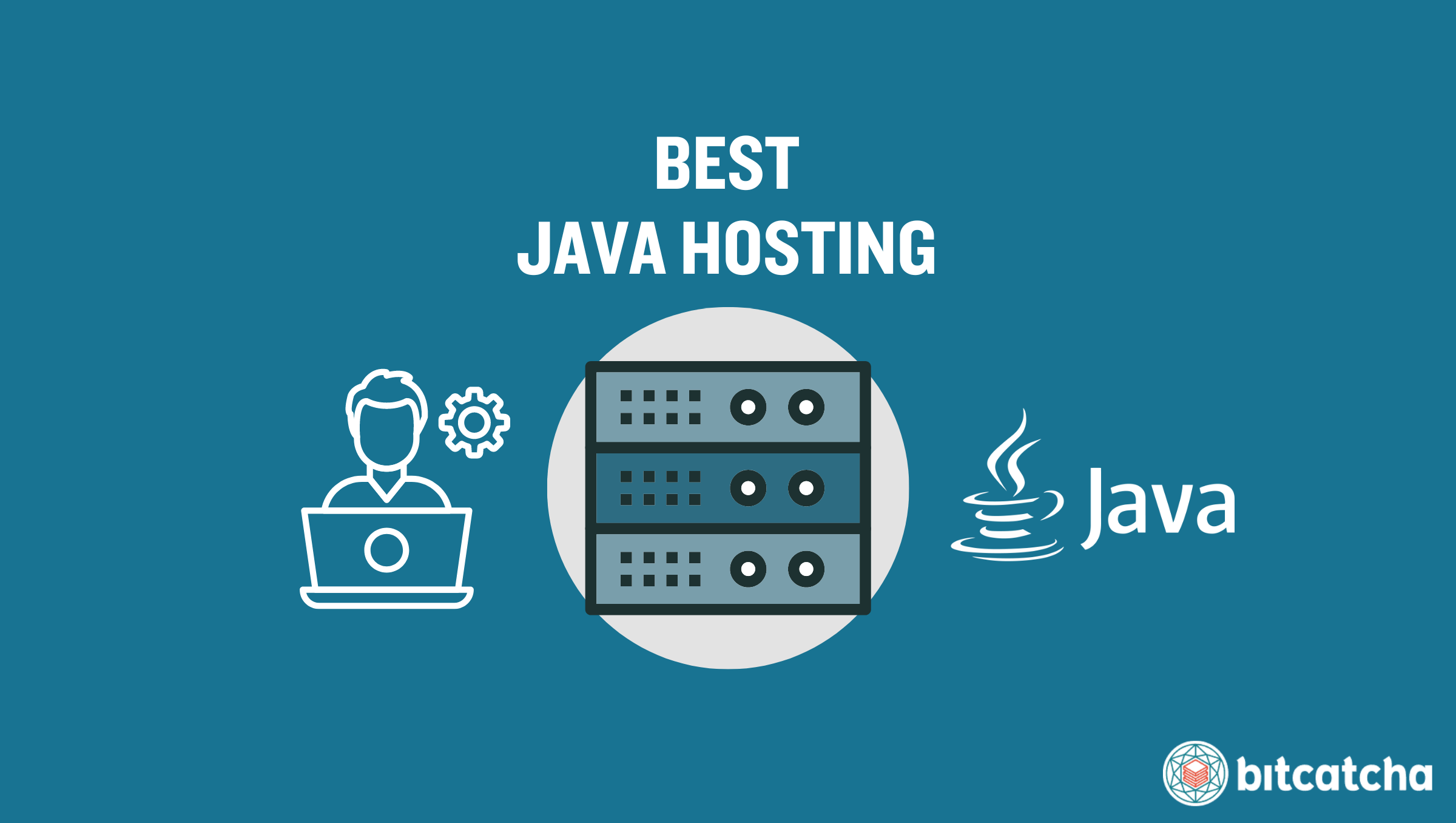
note
The Malaysian prices in this article are calculated using an exchange rate of 1 USD to 4.5 MYR.

1. Hostinger
https://www.hostinger.com/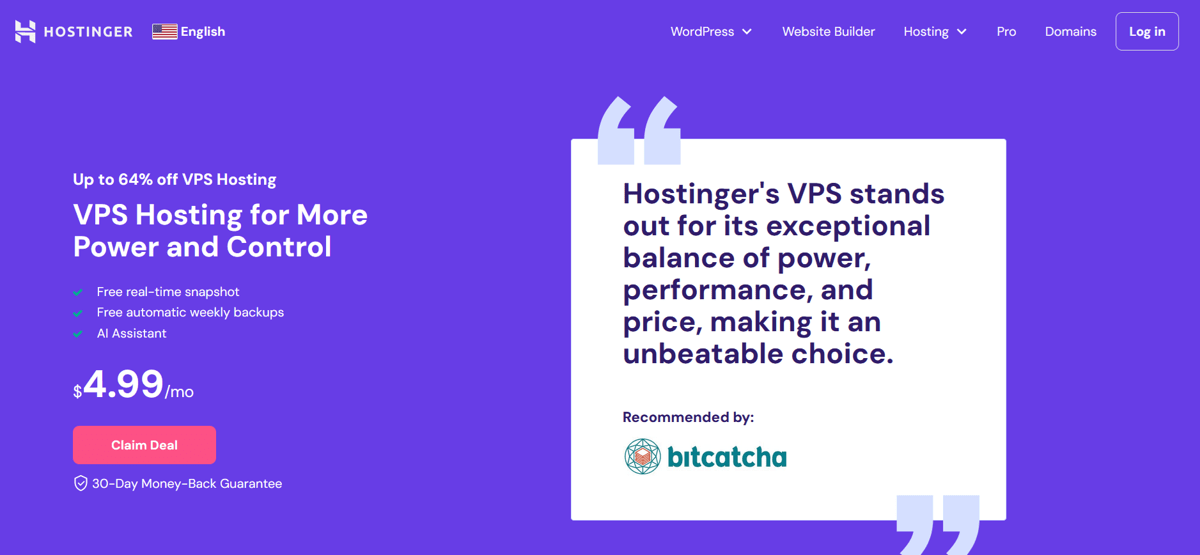
Hostinger’s KVM 1 VPS plan offers the ideal Java hosting solution for developers and businesses who need both speed and value for money. This plan includes 1 vCPU core, 4 GB RAM, and 50 GB of NVMe SSD storage. This ensures swift data access and processing speeds which are essential for Java-based applications. Their infrastructure is built on AMD EPYC processors and HPE and DELL servers. Hostinger also lets its VPS customers pick between 5 data center locations across Europe, Asia, North America and South America. This reduces latency and improves loading times for visitors.
Hostinger gives full root access to VPS customers to give them complete control over the server and allows the configuration of various Java frameworks. Hostinger supports a wide range of Linux distributions like Ubuntu that are ideal for installing Java and they have produced detailed Java-specific articles in their knowledgebase to explain how to perform Java-related hosting tasks.
Security features include automated weekly backups and manual snapshot capabilities, which are crucial for data integrity and recovery. You also get 24/7 support and an AI Assistant. Hostinger’s commitment to satisfaction is underscored by a 30-day money-back guarantee. Learn more in our deep dive on Hostinger.
What are the pros and cons of Hostinger Java hosting?
Pros
- High-speed NVMe SSD storage
- 5 VPS data centers provide low-latency hosting options across continents
- Full root access
- Automated weekly backups and snapshot capabilities enhance data security
- Affordable pricing with a strong set of features offers excellent value for money
- Scalable resources allow easy upgrades as your needs grow
Cons
- Limited to Linux-based operating systems
- No phone support
- No managed VPS plans

2. TMDHosting
https://www.tmdhosting.com/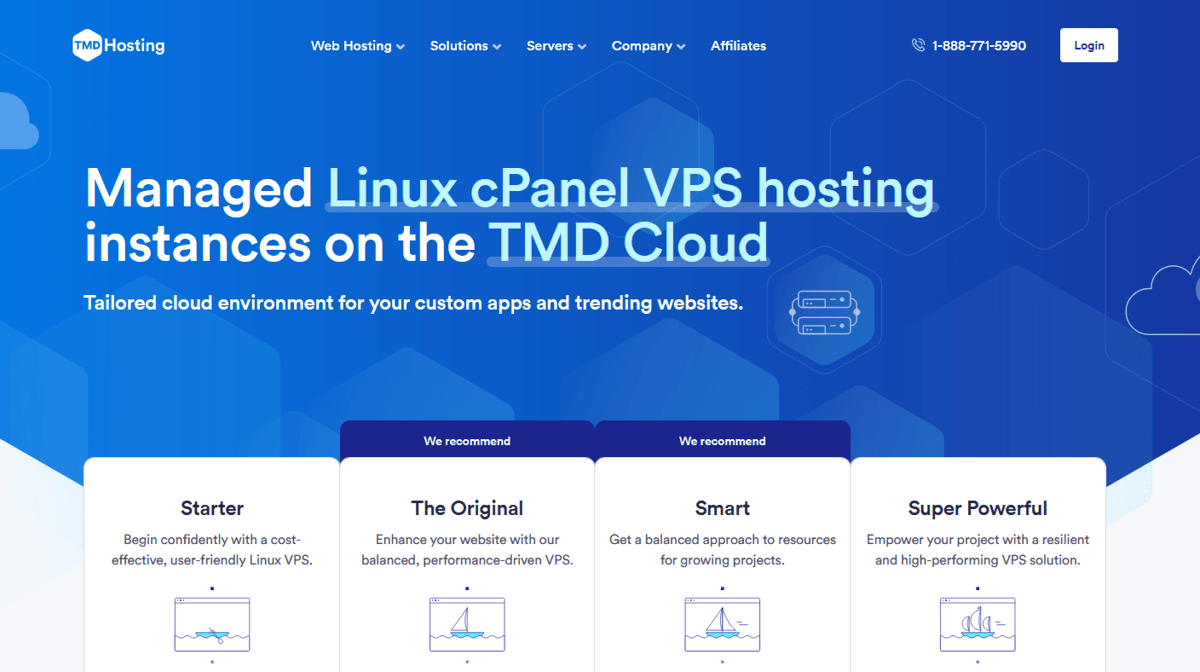
TMDHosting’s VPS Starter Plan is engineered for Java developers needing more resources and full control over their hosting environment. You get dedicated resources using virtualization technology. This includes 60GB SSD storage and 2TB bandwidth. You also get 2 CPU cores, 2GB DDR4 RAM, a free SSL certificate and the industry-standard cPanel/WHM.
TMDHosting provides root access upon request for its VPS plans. You also get access to SSH and SFTP. They support both MySQL 8 and MariaDB 10.6 which unlocks advanced database performance critical for Java-based applications. Unlimited MySQL databases are included in all their plans.
A unique aspect of TMDHosting’s VPS plans is that they all come with ongoing managed services for no extra price. This means their Site Reliability Engineers take care of daily updates and optimizations to keep your servers running at their peak. Learn more in our deep dive on TMDHosting.
What are the pros and cons of TMDHosting Java hosting?
Pros
- Dedicated resources guarantee better performance and reliability
- Full root access and unlimited MySQL databases
- Generous SSD and bandwidth
- Free SSL and cPanel/WHM
- Managed VPS plans
Cons
- Not the cheapest
- Not many Java-specific resources or tutorials

3. A2 Hosting
https://www.a2hosting.com/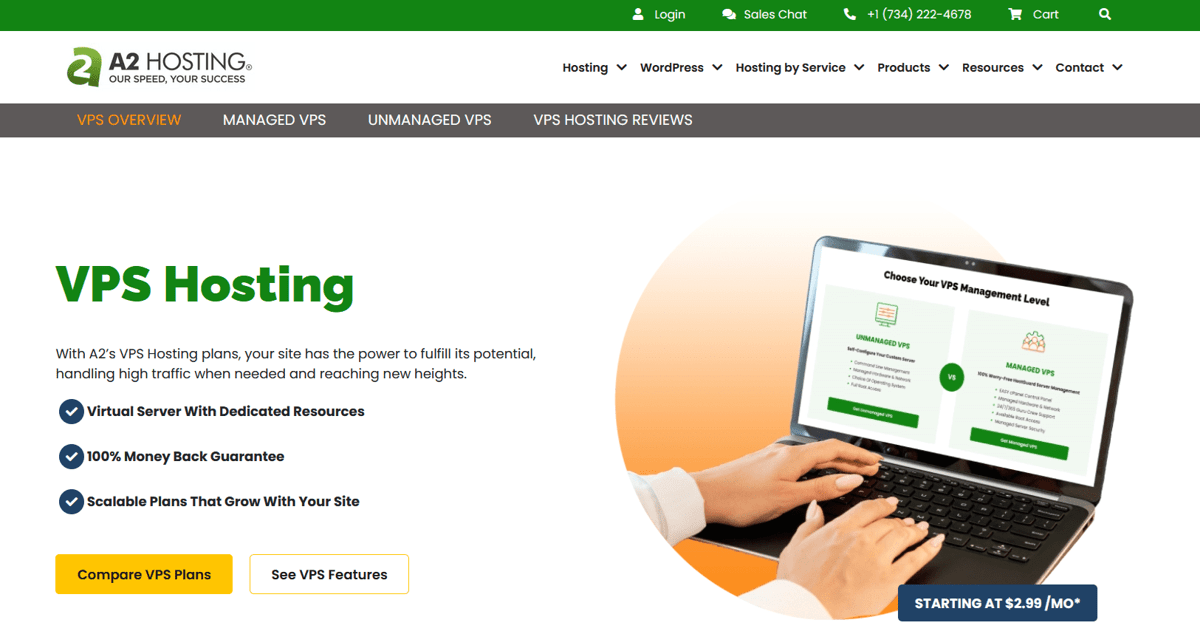
A key differentiator for A2 Hosting is its relentless focus on speed. Their Turbo Servers, powered by the SwiftServer platform, are specifically optimized for blazing-fast performance. With the use of SSDs and the option for their 20 times faster Turbo Server (AMD EPYC Servers with NVMe drives), A2 Hosting ensures that your Java applications run with unparalleled speed and responsiveness.
Setting up Java on your VPS is made easy with A2 Hosting’s free Webuzo software installer, which allows for a convenient 1-click installation process. In addition to Webuzo, A2 Hosting provides other Java hosting software options such as Ubuntu (evolved from Debian), Apache Tomcat, and Nginx, giving you the flexibility to choose the software stack that best suits your needs.
With A2 Hosting, you can have full confidence that your Java projects will benefit from the exceptional speed and performance they offer, allowing you to deliver the best experience to your users. Find out more in our in-depth A2 Hosting review!
What are the pros and cons of A2 Hosting Java hosting?
Pros
- Fast speeds and high-performance provider
- Excellent customer support from A2 Hosting’s Guru Crew
- Scalable VPS hosting plans
- Developer-friendly provider
Cons
- Turbo servers at additional costs
- NVMe SSD only available in the topmost tier

4. HostGator
https://www.hostgator.com/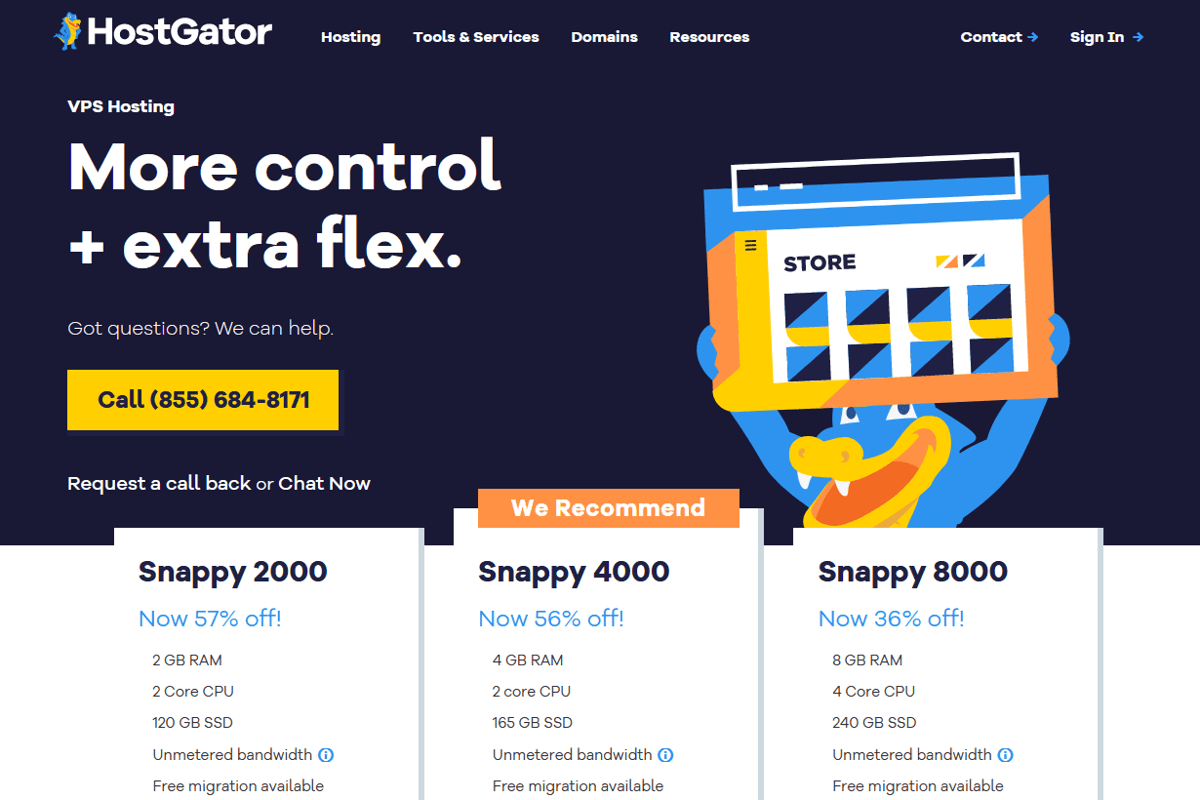
When it comes to reliable and versatile hosting, HostGator stands out as a trusted name in the industry. They offer specialized Java hosting solutions in their VPS and dedicated offerings, specifically designed to meet the unique needs of Java developers and applications.
In HostGator’s Java hosting environment, you can expect top-notch performance, enhanced security, and the flexibility to optimize your Java applications. They leverage the latest technologies and server configurations to ensure seamless and efficient operation of your Java code.
To harness the power of Java, you can utilize SSH access to install and configure Java on your VPS or Dedicated server. HostGator supports Tomcat Java, a powerful framework that implements Java Servlet and JavaServer Pages. With Tomcat, you can create dynamic web applications in a “pure Java” environment.
It’s worth noting that Tomcat Java is available on Linux or Windows Dedicated Server and VPS plans of Snappy 2000 or higher. While it’s not available on Shared or Reseller servers, HostGator provides Tomcat as an add-on in cPanel for Linux and as an add-on in Plesk for Windows, ensuring flexibility for your hosting needs. Find out more in our in-depth HostGator review!
What are the pros and cons of HostGator Java hosting?
Pros
- Network uptime guarantee
- Premium support for VPS and dedicated solutions
- Pricing plans are easily scalable
- Comprehensive security measures
Cons
- Data centers are in the US only
- Mixed reviews on customer support

5. Bluehost
https://www.bluehost.com/
Bluehost is a well-established hosting provider that offers a range of hosting solutions, including reliable options for Java hosting. With their Java VPS and dedicated hosting plans, you can harness the power of their robust infrastructure and enjoy a secure environment for your Java applications.
One of Bluehost’s key advantages is their user-friendly setup process, making them an excellent hosting choice for beginners and experienced developers alike. With just a few clicks, you can have your Java environment up and running on Bluehost, ready to host your apps and websites. Enabling Java on Bluehost’s VPS or dedicated hosting is as simple as activating Sudo Access in your cPanel.
In addition to its easy setup, Bluehost offers a range of resources and features specifically designed to support your Java development needs. With generous storage space and bandwidth, you can ensure that your Java projects have the necessary resources to operate efficiently. Find out what makes Bluehost stand out in our thorough review.
What are the pros and cons of Bluehost Java hosting?
Pros
- Affordable dedicated hosting pricing
- Easy to scale up or down
- Dedicated support via phone/live chat
- Comprehensive knowledge base for reference
- Improved cPanel to manage your websites easily
Cons
- Customer support quality is not as good as before
- Auto-renew at the regular rate (significant hike)

6. Liquid Web
https://www.liquidweb.com/
Liquid Web is a top choice with its premium Java hosting. They utilize the latest technologies, including top-of-the-line hardware and network infrastructure, to ensure your Java applications perform at their best 24/7. Their servers are optimized for lightning-fast data retrieval to boost performance. Also, Liquid Web allows you to install Java on Windows and Ubuntu.
What sets Liquid Web apart is its focus on security. They implement a range of advanced security measures, including firewalls, intrusion detection systems, and regular security patches and updates. These measures ensure that your Java applications are shielded from potential threats and vulnerabilities, allowing you to focus on your development without worrying about security risks. Find out what makes Liquid Web stand out on the official website.
What are the pros and cons of Liquid Web Java hosting?
Pros
- 100% Network and Power Uptime SLAs
- Top-notch customer support
- Advanced security and reliability
- Cloudflare CDN for faster website access
- Off-site backups by default
Cons
- Limited data center locations
- Plans are comparatively pricey

7. JavaPipe
https://www.javapipe.com/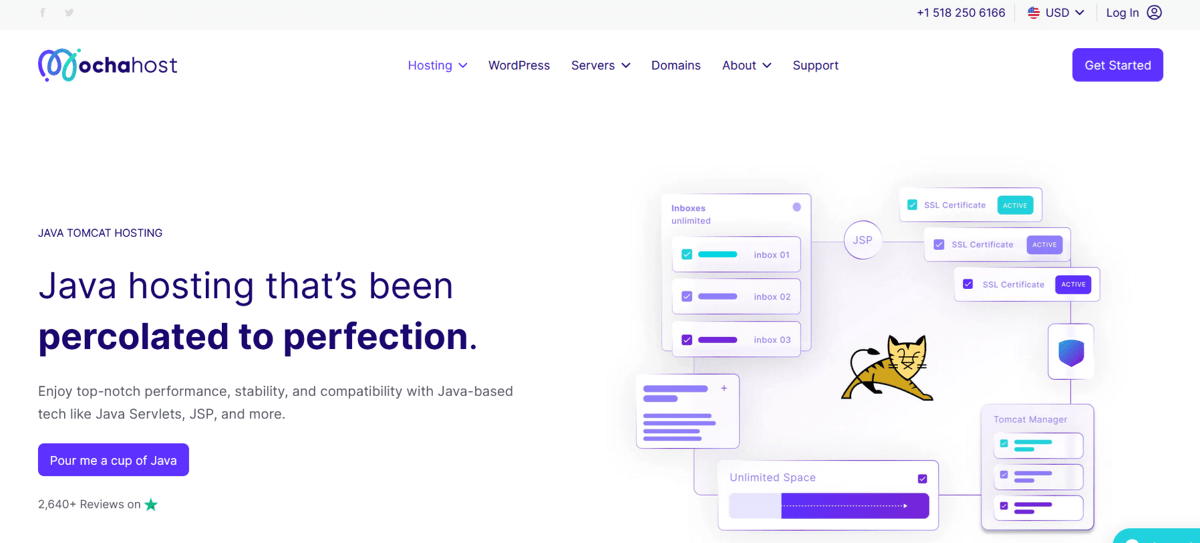
JavaPipe is a hosting provider that specializes in Java hosting solutions. They understand the unique requirements of Java applications and offer hosting plans tailored for Java developers. With JavaPipe, you can expect a Cloud hosting environment optimized for speed, performance, and reliability for Java projects.
With JavaPipe’s managed Java hosting solutions, you can concentrate your efforts on your business while leaving the technical management of your hosting in their capable hands. Leveraging SSD storage, their Java Cloud platform delivers stability and redundancy, minimizing downtime and ensuring your Java projects run smoothly.
Each Java virtual machine web hosting plan includes an integrated Tomcat container, providing dedicated memory for your JVM heap and permanent generation space. You can easily manage your Java hosting using the custom SiteWorx control panel provided within your hosting package. This intuitive interface allows you to efficiently handle essential aspects such as email accounts, FTP, and databases, offering a simplified and efficient approach to hosting management. Learn more in our MochaHost review.
What are the pros and cons of JavaPipe Java hosting?
Pros
- Java-hosting-oriented provider
- Unlimited MariaDB databases
- Scalable Java Cloud hosting plans
- Developer-friendly tools and resources
- Affordable hosting plans
Cons
- No unlimited bandwidth for all plans
- No unlimited storage for all plans
- Limited hosting options (since they focus only on Java hosting)

8. DailyRazor
https://www.dailyrazor.com/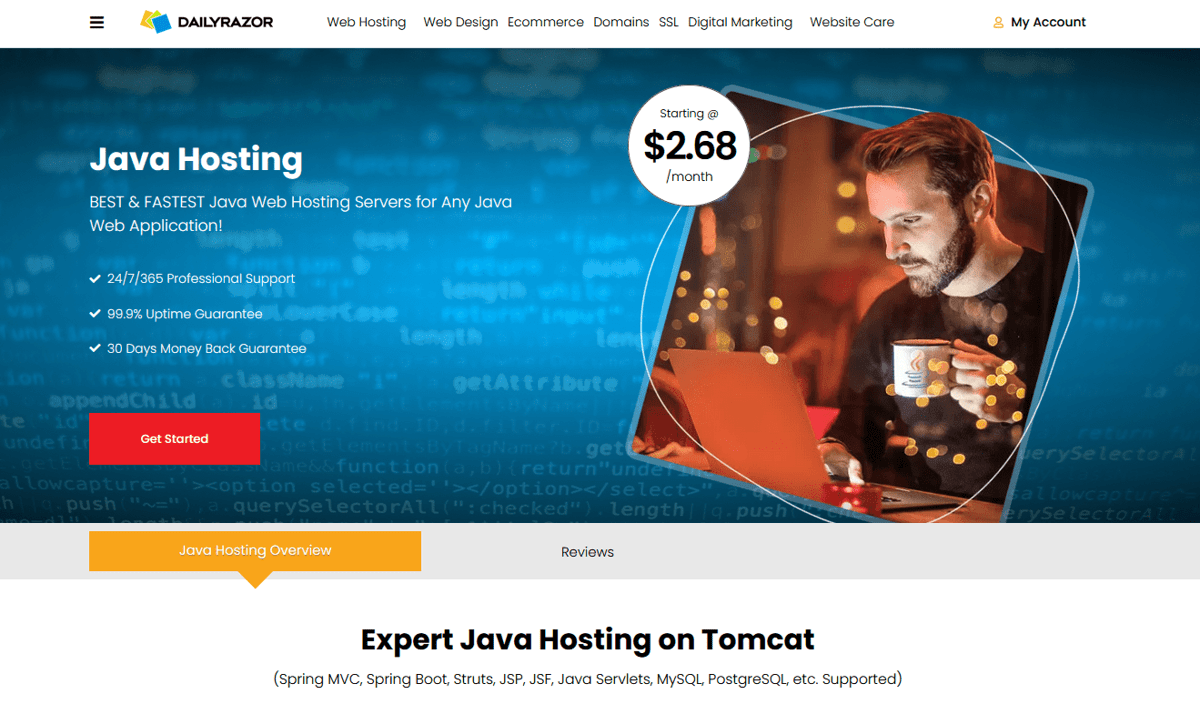
DailyRazor is a hosting provider that offers reliable hosting solutions for Java developers. They understand the intricacies of hosting Java applications and provide a stable platform to support your projects.
Their Java hosting plans come with robust server configurations, including the latest versions of Java and ample resources to support your Java applications. You can choose among shared or private Tomcat, or Cloud VPS with root access for your Java hosting. What’s more, DailyRazor also offers a range of additional features and tools to enhance your Java hosting experience and gives you cPanel/WHM to manage your Java hosting seamlessly. Get more information through the official website of DailyRazor.
What are the pros and cons of DailyRazor Java hosting?
Pros
- Stability and reliability-focused provider
- Offers Java-hosting-oriented plans
- Scalable Java hosting plans
- Feature-rich and value-for-money Java hosting plans
- Developer-friendly tools and resources
Cons
- Require learning curve for beginners
- No free domain name for the lowest four plans
What Is Java Hosting?
Java hosting is a web hosting service that is tailored to support Java applications. It provides the optimal server environment needed to run Java-based software, including web and enterprise applications.
Java hosting is therefore a subset of developer web hosting that specializes in assisting developers make the most of the Java platform. It supports the Java Runtime Environment (JRE) which is the software that allows Java programs to run by managing communication between Java applications and the operating system. Java hosting also supports the Java Development Kit (JDK), and Java frameworks like Spring or Hibernate. It also supports running applications on Apache Tomcat which is crucial for efficiently deploying and managing dynamic, scalable Java applications.
What Is Java?
Java is a robust programming language used to develop Java applications. Its rules and syntax are based on the C and C++ programming languages. Java was first released by Sun Microsystems in 1995 and is today a popular language choice for enterprise systems as well as applications in data science and machine learning. Java is a popular choice for its cross-platform capabilities, scalability, and strong community support. Java applications execute inside the Java Virtual Machine (JVM), which allows the same code to run on multiple platforms.
What Is Java Virtual Machine (JVM)?
The Java Virtual Machine (JVM) is part of the Java Runtime Environment (JRE) that enables Java programs to run across different platforms. It interprets compiled Java bytecode and converts it into machine code for execution by the host system. The JVM also manages memory and provides security features to safeguard applications from threats. Java hosts configure their servers to support specific JVM versions and this ensures compatibility and performance for hosted Java applications.
What Is Apache Tomcat?
Apache Tomcat is an open-source web server and servlet container used to deploy Java applications. It supports running Java Servlets and Jakarta Server Pages (JSP) in a web environment. Tomcat is popular for hosting Java-based web applications due to its lightweight structure and ease of configuration. It provides a stable environment for developing and managing dynamic web content and is therefore preferred by developers. Many Java hosting providers offer pre-installed and pre-configured Tomcat servers, simplifying the deployment of Java web applications.
What Is Servlet?
A Servlet is a Java program that runs on a web server to handle requests from web browsers or other clients. Servlets generate dynamic web content, such as processing form data or managing sessions. They work within the server to respond to HTTP requests and generate HTML responses. Servlets are key to Java web applications, as they enable efficient server-side processing and interaction with databases or other resources. Java hosting environments are typically set up to support Servlet containers and enable server-side processing.
What Is Jakarta Server Pages (JSP)?
Jakarta Server Pages (JSP), formerly known as JavaServer Pages, is a technology that allows developers to embed Java code directly into HTML pages for server-side processing. JSP is commonly used to create dynamic web pages, interact with databases, and manage user sessions. It simplifies web application development by separating the user interface from business logic, which is how data is created, stored, and modified based on the operations and objectives of a business or organization. Java hosting often provides server configurations to support JSP processing.
What Are My Options for Java Hosting?
You have 3 options for Java Hosting: shared, VPS and cloud hosting. Java shared hosting is a type of hosting where multiple users share a single server’s resources. This option is the most affordable but provides limited control and performance. it’s best suited for small Java applications with basic requirements.
Java VPS (Virtual Private Server) hosting offers each user virtually partitioned servers and dedicated resources like CPU, RAM, and storage. This suits Java applications that require more resources and stability. Java cloud hosting works by distributing your Java application across multiple servers (“the cloud”). This setup ensures greater redundancy and scalability as you’re able to easily add or reduce resources based on your Java application’s needs.
Opt for Java hosting types that include root access if you desire full control over your Java application. Root access in web hosting provides full administrative control over the server environment. Java VPS hosting and Java cloud hosting plans typically include root access and therefore suit more complex Java applications that require heavier customization.
Who Are the Java VPS Providers?
4 Java VPS providers are Hostinger, TMDHosting, A2 Hosting, and HostGator. Hostinger offers budget-friendly VPS plans with root access and scalable resources. TMDHosting offers fast SSD storage and CloudLinux-powered servers. A2 Hosting is tailored for developers with its developer-friendly tools, including root access and options for pre-configured Java environments. HostGatr focuses on scalability and offers VPS plans that allow you to easily upgrade resources as your Java application grows.
Who Are the Java Cloud Hosts?
Two Java cloud hosts are Liquid Web and OVHCloud. Liquid Web provides high-performance cloud hosting with fully managed services and 24/7 proactive monitoring. OVHCloud offers customizable cloud plans with pay-as-you-go pricing. Their global network of data centers make them a strong option for Java applications that require flexibility and a geographically distributed user base.
How Much Does Java Hosting Cost?
Java hosting costs RM12 to RM211.50 per month depending on the type of Java hosting selected and the web hosting provider. This price range covers access to shared, VPS, and cloud hosting options for Java applications. Java shared hosting is on the more affordable end of the spectrum since you are sharing server resources and costs with other websites. VPS and cloud hosting come at higher prices because they involve larger allocations of resources and more complex server set-ups.
What Makes a Cheap Java Hosting?
Cheap Java hosting costs below RM45 per month. This low price tag still covers the essential features of Java hosting such as root access, support for unlimited JSP websites, NVMe (Non-Volatile Memory Express) storage for fast performance, and specialized Java expert support. These features ensure that even budget-friendly hosting plans handle Java applications adequately.
How Do I Choose a Java Host?
There are four important factors to consider when choosing a Java host. The first is that the host offers Apache Tomcat support. Tomcat is a widely used server for running Java applications. The host must support it because Tomcat handles Java Servlets and Jakarta Server Pages (JSP) which are each essential for many Java-based web applications.
The second is that the host regularly updates Tomcat and JDK so that it’s always supporting the latest versions and maintaining compatibility with the latest Java standards. Outdated Tomcat and JDK versions are a recipe for compatibility issues, security risks, and performance problems.
The third factor is that the host must support the Java framework that you need to use for your use case. The best Java hosts support the most popular Java frameworks in order to simplify development and allow the development of reliable Java applications. The final factor is that the host must support Java Database Connectivity (JDBC) if you’re building websites with databases or that require dynamic content generation.
What Are the Tomcat Versions Supported by Java Hosts?
Most Java hosts support Tomcat 9 to Tomcat 10. The specific versions available vary by host, so remember to check their fine print or speak to their support team to confirm that they support the Tomcat version you need to use for your application.
What Are the JDK Versions Supported by Java Hosts?
Most Java hosts support JDK 8, JDK 11, JDK 17, and JDK 21. The available versions depend on the hosting provider so remember to check their fine print or speak to their support team to confirm that they support the JDK version you need to use for your application.
What Java Frameworks Are Supported by Java Hosts?
The 4 Java frameworks supported by most Java hosts are Spring, Struts, Jakarta Faces, and Netty. Spring is a widely used Java framework for building enterprise applications. Struts is known for creating scalable web applications. It helps in structuring web development with clear components. Jakarta Faces (formerly JavaServer Faces) is a Java framework used for building user interfaces. It makes it easier to create dynamic, server-side UIs. Netty is a Java framework for building network applications. It’s used for developing high-performance, low-latency servers. Ensure your Java host supports the exact frameworks you need for your project.
What Is Java Database Connectivity (JDBC)?
Java Database Connectivity (JDBC) is an API (Application Programming Interface) that allows Java applications to interact with databases. JDBC enables applications to execute SQL queries, retrieve data, and update databases. JDBC is often used in Java frameworks like Spring, Struts, Jakarta Faces (formerly JavaServer Faces), and Netty to handle database operations efficiently within web applications. Proper JDBC support is crucial for applications that require database connectivity and data-driven functionality.
Which Is the Best Java Hosting Provider?
The best Java hosting provider depends on your specific needs since Java is renowned for supporting a broad range of applications of every scale. Prioritize finding the web host that’s able to support the exact specifications required for your particular Java use case.
Consider key features such as support for Apache Tomcat, up-to-date JDK versions, and reliable database connectivity with JDBC. The top Java hosting providers also offer root access for full control, scalable resources, and support for popular frameworks like Spring, Struts, Jakarta Faces, and Netty. Hostinger stands out for its affordable VPS plans. These plans provide strong performance, root access, and up-to-date support for Java applications.
| Specifications | Hostinger | TMDHosting | A2 Hosting | HostGator | Bluehost | Liquid Web | JavaPipe | DailyRazor |
|---|---|---|---|---|---|---|---|---|
| Plan name | KVM 1 | Starter | Launch Plans | Snappy 2000 | Standard NVMe 4 | Managed VPS | Soho Java | JAVA-ST1 |
| Storage | 50 GB | 60 GB | 150 GB | 100 GB | 100 GB | 40-200 GB | 30 GB | 2 GB |
| Bandwidth | 4 TB | 2 TB | Unmetered | Unmetered | Unmetered | 10 TB | Unlimited | Unmetered |
| Number of Website | Unlimited | 20 | 1 | Unlimited | 1 | 1 | 1 | 1 |
| Uptime Guarantee | 99.90% | 99.90% | 99.90% | 99.90% | 99.90% | 100% | 99.90% | 99.90% |
| Free domain name | No | Yes | Yes | Yes | Yes | No | No | No |
| Free SSL | Yes | Yes | Yes | Yes | Yes | Yes | Yes | Yes |
| Free backup | Yes | Yes | Yes | Yes | Yes | Yes | No | Yes |
| number of cpu core | 1 | 2 | 4 | 2 | 2 | 2 | 1 | 1 |
| Ram | 4 GB | 2 GB | 4 GB | 4 GB | 4 GB | 2 GB | 1 GB | 2 GB |
| Root access | Yes | Yes | Yes | Yes | Yes | Yes | Yes | Yes |
| SSH | Yes | Yes | Yes | Yes | Yes | Yes | Yes | Yes |
| Price/mo | RM22.50 | RM180 | RM13.50 | RM157.50 | RM211.50 | RM90 | RM28.20 | RM12 |
| See all features |
